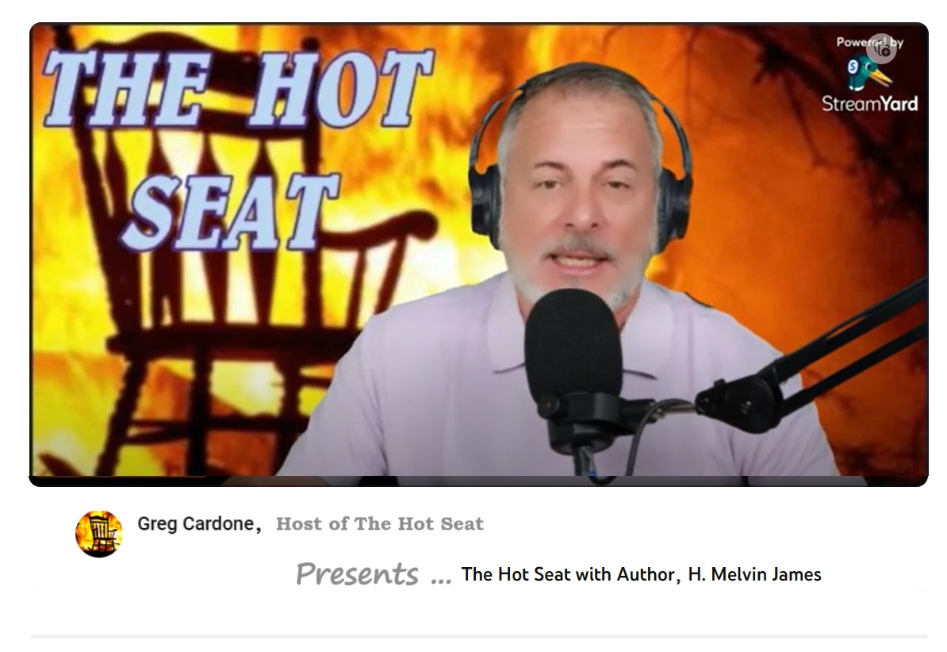The Hot Seat with Author H. Melvin James
-
 H. Melvin James
H. Melvin James
| Follow
| Sunday 21st of July 2024 07:55:16 PM (UTC)
 https://www.h-melvin-james.com/post/an-informative-and-fun-interview
https://www.h-melvin-james.com/post/an-informative-and-fun-interview
Which character do you enjoy writing the most as a writer and why? If choosing a favorite character is like choosing a favorite child, which character do you find requires the most attention and detail from you as a writer?
In my first epic novel the most challenging character was one of the primary protagonists, Lexington Rifle McClary. Lex had an unsettled childhood, followed by a troubled teenage, and a tumultuous adult life including the horrors of war and tragedies in his marriage and his business. He was a complex character of extreme emotion, passion, and irregular mental instability.
Would you like readers to have any specific takeaway from your book?
In my interview with Radio host, Chris Baker, formerly of the Friday Night Author Round-table, he asked me, 'What is the most important message of your book?"
I answered, "I hope “Tares among the Wheat” conveys many messages of encouragement, hope, and faith. My story-lines suggest that the unconquerable collective --- of human decency, determination, and faith --- will ultimately prevail over tragedy, misfortune, and mistreatment.
There are a number of messages in my novel.
None of us just magically appeared on earth in abstract and without attachment. I hope that readers would come to realize that their position in the world and in life, resulted from their many ancestors’ hard work, hopes, and aspirations. They in turn need to provide for the betterment of their successors and future generations.
One important message: Some mistakes, regrets, or wrongful decisions made in life, might not ever be undone or overcame, regardless of the time, effort, and money spent.
After having made peace with God and having sought forgiveness from those offended or those let down, make peace with yourself and put all failings behind. Vow then to make the rest of your life more meaningful than to continue to dwell on, or take self-pity of the past."
Do you have any movie or tv adaptations in the works?
I do not yet have any movie or TV adaptations. My first epic novel of two volumes would be a rich source for a mini-series. It is filled with framed stories of adventure, mystery, and romance, with monumental backgrounds of the celebrated Land Runs of Indian Territory, World War I, the horrific Dust Bowl, the devastating Great Depression, Prohibition, and much more.
My mystery novel to be released this autumn, Death in Tomorrow's Shadow, a first person narrative, is ready-made for a movie. Due to my background, that novel required screening by the National Security Agency before I could send it to the U.S. Copyright office or to my publisher.
Do you listen to music while you write? If so, what kind of music do you like to listen to?
Often I listen to music while I write, only to help drown other noises that might distract me, such as my wife watching television in another room. I believe however, that much of my most creative and moving writing is accomplished after midnight when all is quiet and I do not listen to music. That late-night to early morning writing, sometimes until 4:00 or 5:00 am, may require significant grammar corrections because I was not well alert, but the substance remains. The creative mind is too often distracted, not only by noises and nearby activity, but also by being concerned for grammar while ideas and concepts are flowing.
Are any of the characters in your book based on people in your real life? If so, can you tell us more about that process and how it influenced your writing?
I write from what I know. My background, experience, and education, formal and worldly, are broad, dramatic, and rich. For my first epic novel, I drew on the stories and the characters of my family and their stories, from the Old World, through their immigration to America, to migration west and homesteading. My grandparents were story tellers as were most of that generation, born in the decades of the last of the 19th and the first of the 20th centuries. I lived and worked with much of the same environment, wheat farming, hard labor, cattle ranching, and so forth, but with more modern machinery and technology than my grandparents utilized.
